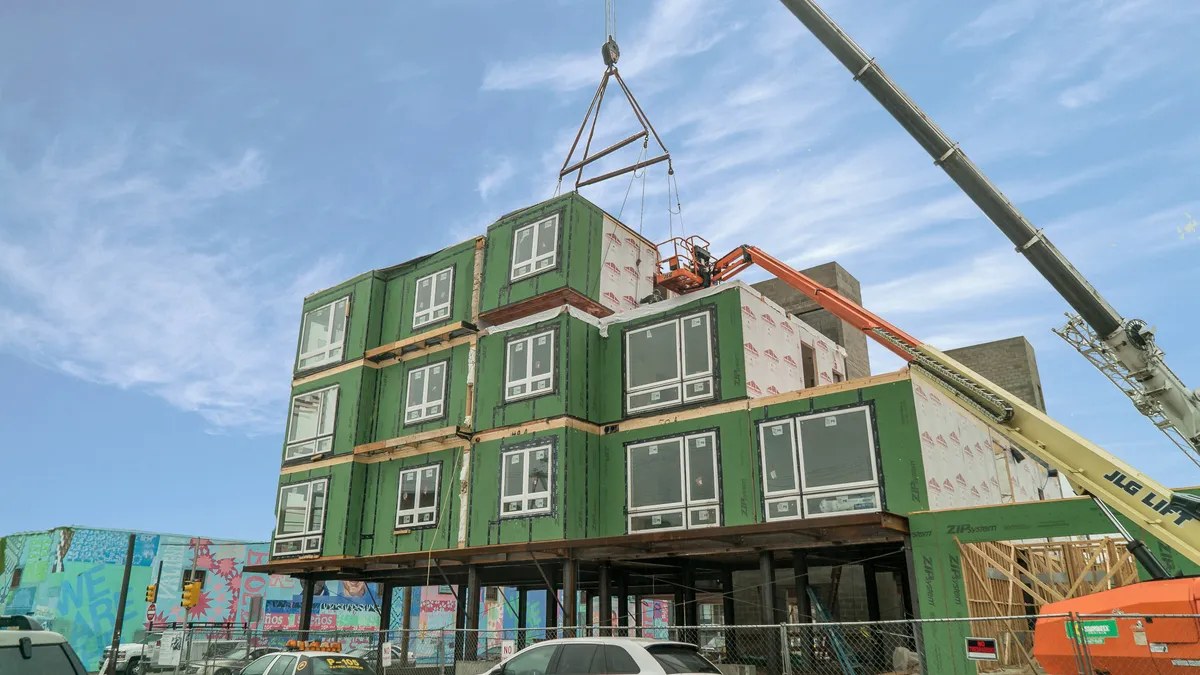Volumetric Building Companies' recent merger with an overseas manufacturer will expand the Philadelphia-based firm's operations and broaden its capabilities, according to CEO Vaughan Buckley.
Poland-based Polcom is a steel modular building and custom furniture manufacturing conglomerate for the hospitality market with clients including Citizen M, Marriott, Hilton, IHG, Kimpton and Accor. The deal will combine VBC's wood construction technology with Polcom's steel modular systems. Polcom will continue to operate all of its current facilities in Poland.
The merger, which was officially completed on Jan. 1, has created a company with more than 500 employees in two continents, with a pipeline of business over $1 billion, according to a release. VBC had roughly 250 employees before the merger. The global company will be led by Buckley and his leadership team in Philadelphia.
The merger come after VBC purchased Katerra's assets in Tracy, California, in August, including its state-of-the-art manufacturing facility for $21.25 million.
Here, Construction Dive talks with Buckley about the goals of the merger, the future of Polcom and the overall focus of VBC.
Editor's note: This interview has been edited for clarity and brevity.
CONSTRUCTION DIVE: What are the goals of this merger?
VAUGHAN BUCKLEY: The result of the merger was really just creating a very strong global entity. The goal of the merger was for us to have the opportunity to spread out diversification of market mix.
Polcom is very experienced in hospitality. VBC is very experienced in multifamily and student housing. Being able to share that knowledge between the firms will allow both of them to diversify. Polcom builds very tall buildings primarily, you know, eight- to 20-plus-story buildings. VBC builds four- to eight-story buildings. So now, any client that comes to us pretty much anywhere in the Northern Hemisphere around the world that wants to see three- to 30-story buildings in hospitality, multifamily or student housing, we can now service them from one of our divisions. And that's really, really exciting for us.
Are there plans to sunset the Polcom brand?
I would say that rather than sunsetting Polcom, I probably would word it a little differently. We will be integrating the Polcom and VBC brand over the next few months. And that assimilation will result in having consistent branding throughout the world. We're not planning on removing the Polcom brand at this time, but we do expect that the companies are going to have a consistent brand within the next six months.
Does the merger change the focus in any way? Polcom has experience in the hospitality space. Is that something that VBC is now going to focus on?
For us it's less sort of changing focus of what we're doing as much as it is expanding capability within our existing focus. Our focus is high-density housing and up until now, that's been sort of up to eight stories and it's been hotels, student housing and multifamily. Now it's up to 30 stories and it's hotels, student housing and multifamily. So it's just a broadening of our capabilities rather than a change of focus.
One of your goals is the productization of modular components. Does this merger help with that?
Yes, so now we're talking about having factories on the East Coast, West Coast and Europe, all producing products for the same kinds of markets. So yes, this is a huge step for us on that productization part, because now we have the opportunity to actually create product and dedicate resources to designing and specifying the platform with which that product resides globally.
And that ties very closely into our new hire announcement yesterday. The CTO for VBC role has been filled by Helena Lidelöw, who is the former head of R&D and design at Lindbäcks in Sweden. So, she comes from arguably one of the most advanced modular construction companies in the world, and it's very specialized in the creation of platforms and products. So, bringing her to VBC plus engaging more locations within VBC allows us to have a bigger impact on that quicker.












